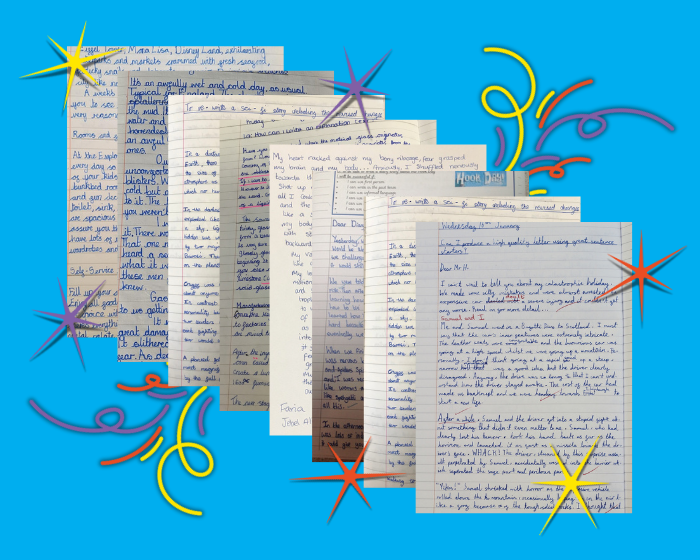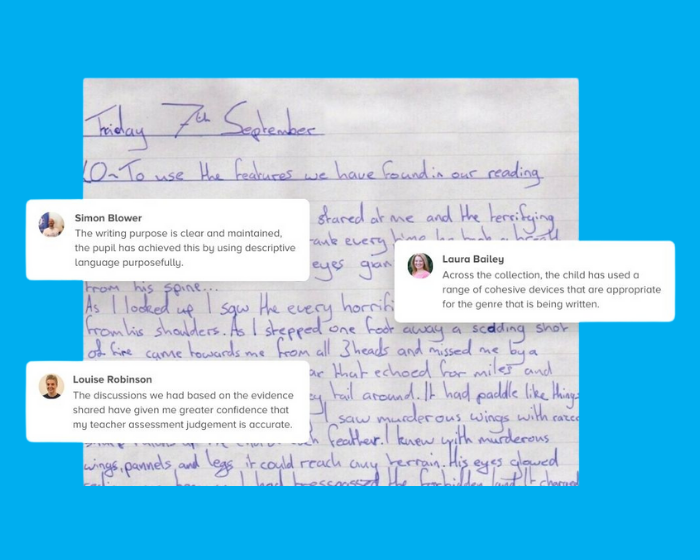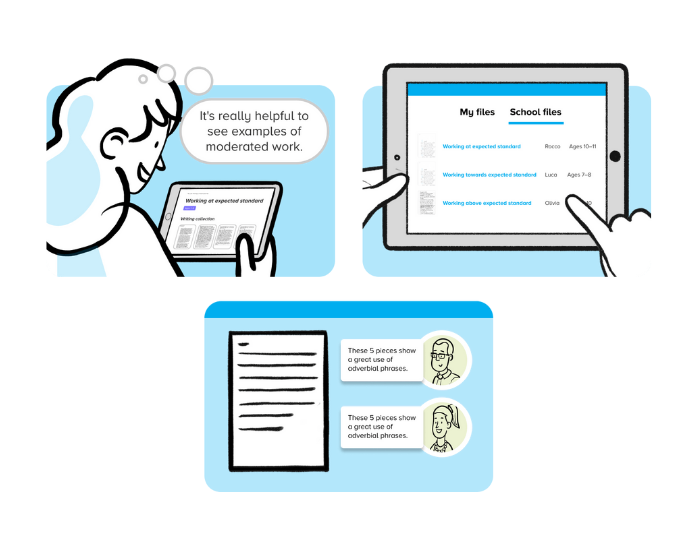As the month of June recently came to a close, as did the writing moderation window for this academic year. Perhaps this was met with a sigh of relief (from schools and moderators). It certainly can be a busy period! Yet, in addition to the potential increase in time, work and attention which may be required if your school do get an external writing moderation phone call, can sometimes be a seemingly negative perception around what the process may entail.
Why might being selected for an external writing moderation visit initially elicit a negative response?
Over the years, I have been privy to a number of conversations (and have read several blogs or commentary on social media) which paint writing moderation in a negative light. Teachers and leaders dreading receiving this call and reporting challenging experiences during the session itself. I would summarise the main complaints as falling into the following categories:
- The time pressures demanded for assessing and finalising judgements (for the whole class – as well as the pupils selected to be moderated).
- A feeling that the moderation team may conduct closed conversations, where they are very much positioned in the role of ‘expert’.
- Pressure on teaching teams (and subsequent impact on data) to meet standards which feel unrealistic, in a subjective experience.
- Extra preparation which is required to produce additional assessment grids or supplementary supporting documents.

What does an effective writing moderation experience consist of?
When considering these points, it seems such a shame that there are educators who have undergone these experiences and have been left feeling this way. The purpose of this blog is not to deny that some statutory writing moderation visits may not have been the most positive.
Instead, this is an opportunity to shine a light on a different perspective.
The other side of a coin where often the negative experiences which are circulated may leave other educators with the impression that ‘this is always the case’.

I have been exceptionally fortunate to have been part of Pobble’s writing moderation process this academic year, led by Laura Bailey who has a wealth of experience and is Head of Assessment and Moderation. I deliberately chose the word ‘celebration’ for the title of this blog as a result of my experiences working with Laura, reflecting the Pobble team’s ethos. Writing should always be celebrated. The children have put their effort and personal choices, experiences and opinions into the written words on the page. Teaching teams have created opportunities for pupils to learn about effective writing devices and to apply these into their own work. This needs to be acknowledged. This needs to be celebrated. This is exactly what happened during the sessions which I shadowed.

So, how would I define an effective external moderation visit, as result of working alongside Laura and her moderation team?
Moderation is a conversation
- The process should not be a one-way street. The moderation team do not hold all of the expertise and power. However, what they do present is a unique opportunity to be objective, to read pupils’ writing with no preconceived ideas or background knowledge. To explore the writer’s technical skills balanced with the requirements of the Teacher Assessment Framework and to value teachers’ judgements – guiding them to explain how a particular standard has been arrived at.
- This is an opportunity to learn. To discuss. To ask questions. To gain insight. Of course, the moderation process is part of a quality-assurance cycle. It is important for moderators (who are indeed experts in their field due to their backgrounds, experience and their training for the role) to open up conversation around why a judgement has been made but the teachers are placed at the heart of this. One of my favourite phrases, shared by Laura is,
“Teachers are the most important part of the jigsaw puzzle.”
- These are their judgements. It is their picture to paint. Their moment to demonstrate to moderators how they have pieced together evidence to make a decision.
- These conversations build confidence. This was truly visible in the sessions I attended. The focus of each visit was to ensure that schools felt secure in their judgements. That the writing of each child was being assessed fairly and accurately against the TAF. There were no comments around data percentages. No questions around leniency or pressure to justify a bigger assessment picture. Teachers and leaders thanked Laura and her fellow moderation team at the end of the conversation. The experience had clearly added value to their own professional learning, which in-turn creates the opportunity to continue to enhance best practice in writing assessment judgements for colleagues in their own schools.

Moderation is a professional learning experience
- Moderating writing is not an easy process. When this is conducted with purpose and focus throughout the year it should seek to upskill teachers (across all year groups) with the ability to discern between the standards and become familiar with the TAF objectives. These opportunities should promote collaboration and conversation. All schools are working towards the same teacher assessment deadlines, so the potential to receive an external moderation call should not be a surprise or a cause for alarm.
- Pobble’s online moderation tool provides a powerful professional learning opportunity which supports the development of purposeful conversations around making robust and secure writing judgements. Enriched with training sessions, the ability to store and share writing samples and a focus on supporting teachers and leaders to celebrate, and identify next steps, which are tailored to their individual school. This is an investment in confidence and skill which has a long-term focus. A commitment to enhancing educators’ authentic understanding around making decisions about writing.
- So, if your school is selected for a statutory visit, this is another opportunity to learn. To celebrate. A chance to have a professional dialogue with a team who hold an expertise in this area. A space to ask questions and gain wider perspectives, as moderators are often teachers or leaders from other schools so have an additional wealth of knowledge and experience which can be shared to enrich and inform. A natural extension of the conversations and learning experiences which have been intentionally taking place throughout the year.
Moderation is a tool for reflection
- Perhaps your school received the external moderation call this year. Possibly they didn’t. Either way, as the end of the school year arrives and the summer break begins, could this be a time to reflect on the internal writing moderation experiences which are provided in your school (or wider cluster or Trust) throughout the academic year?
- When a purposeful writing moderation cycle is effectively embedded, it is the hope that a number of the negative experiences (cited at the start of this blog) will not be a consideration. Empowering educators, not just in Year 6 but across the whole school, ensures that moderation becomes not just an integral but a positive part of the teaching and assessment cycle.
- Another area where a moderation conversation can support reflection is in the writing experiences offered to pupils. Have writing opportunities been diverse, motivating and empowering? Are the models of writing studied rich, high-quality and ambitious, promoting outcomes which embody techniques and approaches which seek to engage an identified purpose and audience? Do pupils have ample opportunities to write?

How Pobble’s online moderation tool can help
In addition to the authentic commitment from Laura and her moderation team to ensure that the external moderation experience embodied all of the above best practice approaches and values, the running of the sessions online added further positive elements. Firstly, teams were familiar with the benefits of using Pobble’s online moderation tool, as they had implemented it to support their internal collaborative conversations and experiences over the course of the year. This meant that, with the selected writing collections seamlessly uploaded onto Pobble’s site, all attending members had access to the writing and conversations exemplifying judgements were done so with ease. If a moderator, or member of staff, felt they would like to further showcase a piece of writing, a photo was taken and uploaded to the platform in mere seconds.
Then, there were the logistical elements. Not only was it simple to log onto the online call but this widens the scope for others who are able to attend. For example, team members within MATs who may not be based at the school but who would like to be part of the conversation. Not only does this strengthen the ability for a number of voices to be heard and valued but also allows for key messages and learning experiences to be taken directly to other schools and settings. Spreading the importance of professional dialogues, areas for celebration and consideration.
Schools are also equipped with a digital set of validated writing collections (alongside others that they have built up throughout the year). A set of exemplars which they have a further confidence in the robust judgements of. Pieces of writing which can continue to effectively add to further internal writing moderation training and reflection opportunities in the next academic year.

Stepping into a positive mindset
It is important to acknowledge that building a positive culture around the external moderation process is an integral part of the potential successful and celebratory experiences explored in this blog. Leaders and teachers have a significant part to play in the cultivation of an empowered and open-minded approach to this experience. As of course, do the moderation team.
Ensuring that moderation experiences are intentionally planned into professional learning experiences across the academic year, taking account of the different ways in which they can be organised and conducted, is important.
If your school is exploring how to make moderation more collaborative, consistent and confidence-boosting, check out how Pobble can support you: https://www.pobble.com/moderation
Empowering teachers and leaders with the knowledge, skills and understanding around English curriculum development and writing outcomes is a true passion of mine. To discover my bespoke training offerings, be sure to take a look at my services.
To discover further ideas around how to make internal writing moderation sessions practical, purposeful and joyful, take a look at my ‘glimmer’: https://open.substack.com/pub/lauraspargo/p/writing-moderation?r=4cvlkw&utm_campaign=post&utm_medium=web
